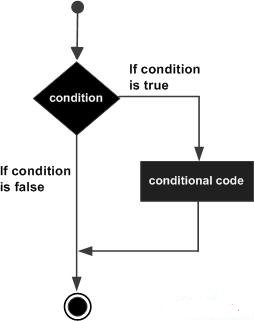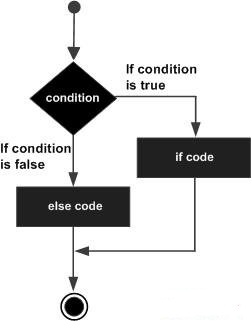if条件语句怎么在Go语言项目中使用?很多新手对此不是很清楚,为了帮助大家解决这个难题,下面小编将为大家详细讲解,有这方面需求的人可以来学习下,希望你能有所收获。
if语句
if语句包含一个布尔表达式后跟一个或多个语句。
语法
if语句在Go编程语言的语法是:
复制代码 代码如下:
if(boolean_expression)
{
/* statement(s) will execute if the boolean expression is true */
}
如果布尔表达式的值为 true,那么if语句里面代码块将被执行。如果if语句的结束(右大括号后)布尔表达式的值为false,那么语句之后第一行代码会被执行。
流程图:

例子:
复制代码 代码如下:
package main
import "fmt"
func main() {
/* local variable definition */
var a int = 10
/* check the boolean condition using if statement */
if( a < 20 ) {
/* if condition is true then print the following */
fmt.Printf("a is less than 20\n" )
}
fmt.Printf("value of a is : %d\n", a)
}
让我们编译和运行上面的程序,这将产生以下结果:
a is less than 20; value of a is : 10
if...else语句
if语句可以跟着一个可选的else语句,布尔表达式是假时它被执行。
语法
在Go编程语言中的if ... else语句的语法是:
复制代码 代码如下:
if(boolean_expression)
{
/* statement(s) will execute if the boolean expression is true */
}
else
{
/* statement(s) will execute if the boolean expression is false */
}
如果布尔表达式的值为true,那么if代码块将被执行,否则else代码块将被执行。
流程图:

例子:
复制代码 代码如下:
package main
import "fmt"
func main() {
/* local variable definition */
var a int = 100;
/* check the boolean condition */
if( a < 20 ) {
/* if condition is true then print the following */
fmt.Printf("a is less than 20\n" );
} else {
/* if condition is false then print the following */
fmt.Printf("a is not less than 20\n" );
}
fmt.Printf("value of a is : %d\n", a);
}
当上述代码被编译和执行时,它产生了以下结果:
a is not less than 20; value of a is : 100
if...else if...else 语句
if语句可以跟着一个可选的else if ... else语句,这是非常有用的使用单个 if...else if 语句声明测试各种条件。
当使用if , else if , else语句有几点要记住使用:
if可以有零或一个else,它必须跟从else if后面。
一个if可以有零到个多else if并且它们必须在else之前。
一旦一个else if测试成功,其它任何剩余else if将不会被测试。
语法
if...else if...else在Go编程语言中语句的语法是:
复制代码 代码如下:
if(boolean_expression 1)
{
/* Executes when the boolean expression 1 is true */
}
else if( boolean_expression 2)
{
/* Executes when the boolean expression 2 is true */
}
else if( boolean_expression 3)
{
/* Executes when the boolean expression 3 is true */
}
else
{
/* executes when the none of the above condition is true */
}
例子:
复制代码 代码如下:
package main
import "fmt"
func main() {
/* local variable definition */
var a int = 100
/* check the boolean condition */
if( a == 10 ) {
/* if condition is true then print the following */
fmt.Printf("Value of a is 10\n" )
} else if( a == 20 ) {
/* if else if condition is true */
fmt.Printf("Value of a is 20\n" )
} else if( a == 30 ) {
/* if else if condition is true */
fmt.Printf("Value of a is 30\n" )
} else {
/* if none of the conditions is true */
fmt.Printf("None of the values is matching\n" )
}
fmt.Printf("Exact value of a is: %d\n", a )
}
让我们编译和运行上面的程序,这将产生以下结果:
None of the values is matching Exact value of a is: 100
看完上述内容是否对您有帮助呢?如果还想对相关知识有进一步的了解或阅读更多相关文章,请关注亿速云行业资讯频道,感谢您对亿速云的支持。
免责声明:本站发布的内容(图片、视频和文字)以原创、转载和分享为主,文章观点不代表本网站立场,如果涉及侵权请联系站长邮箱:is@yisu.com进行举报,并提供相关证据,一经查实,将立刻删除涉嫌侵权内容。